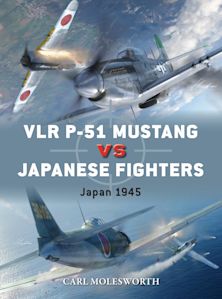The Kamikaze Campaign 1944–45
Imperial Japan's last throw of the dice
The Kamikaze Campaign 1944–45
Imperial Japan's last throw of the dice
Description
An illustrated history of how Japan devised and launched a new kind of air campaign in late 1944 – the suicidal assaults of the kamikaze units against the approaching Allied fleets.
As summer changed to autumn in 1944, Japan was losing the war. Still unwilling to surrender, Japan's last hope was to try to wear down US resolve enough to reach a negotiated settlement. Extraordinary measures seemed necessary, and the most extraordinary was the formation of Special Attack Units – known to the Allies as the kamikazes.
The concept of organized suicide squadrons was first raised on June 15, 1944. By August, formations were being trained. These formations were first used in the October 1944 US invasion of the Philippine Islands, where they offered some tactical success. The program was expanded into a major campaign over the rest of the Pacific War, seeing a crescendo during the struggle for Okinawa in April through May 1945.
This highly illustrated history examines not just the horrific missions themselves, but the decisions behind the kamikaze campaign, how it developed, and how it became a key part of Japanese strategy. Although the attacks started on an almost ad hoc basis, the kamikaze soon became a major Japanese policy. By the end of the war, Japan was manufacturing aircraft specifically for kamikaze missions, including a rocket-powered manned missile. A plan for a massive use of kamikazes to defend the Japanese Home Islands from invasion was developed, but never executed because of Japan's surrender in August 1945.
Packed with diagrams, maps and 3D reconstructions of the attacks, this book also assesses the Allied mitigation techniques and strategies and the reasons and the degree to which they were successful.
Table of Contents
CHRONOLOGY
ATTACKER'S CAPABILITIES
The last of Japanese airpower
Aircraft
Facilities and infrastructure
Weapons and tactics
DEFENDER'S CAPABILITIES
The encroaching fleet
Aircraft
Facilities and infrastructure
CAMPAIGN OBJECTIVES
The last throw of the dice
Japanese objectives and plans
Allied objectives and plans
THE CAMPAIGN
Dying for the Emperor
The first round: October 25–November 30, 1944
Countering the kamikazes: December 1, 1944–January 13,
1945
Formosa, Iwo Jima, and long-range raids: January
14–March 26, 1945
The long grind, Okinawa: March 27–June 30, 1945
Downfall: June 30, 1944–March 1946
AFTERMATH AND ANALYSIS
Surviving aircraft and ships
FURTHER READING
INDEX
Product details
| Published | May 24 2022 |
|---|---|
| Format | Paperback |
| Edition | 1st |
| Extent | 96 |
| ISBN | 9781472848444 |
| Imprint | Osprey Publishing |
| Illustrations | Illustrated throughout with around 60 photos and at least 14pp of colour illustrations |
| Dimensions | 248 x 184 mm |
| Series | Air Campaign |
| Short code | ACM 29 |
| Publisher | Bloomsbury Publishing |
Reviews

Resources
Discover More
Visit our exclusive member's website to see artwork, maps, and more from this book.

Resources
Book Vote
Tell us what titles you would like to see published by Osprey, then vote for your favourites in our monthly book vote!



























